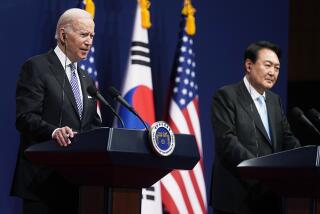Christopher Doubts China Veto on N. Korea Sanctions : Diplomacy: U.N. vote expected over nuclear plant inspections.
- Share via
WASHINGTON — Secretary of State Warren Christopher predicted Sunday that China will not veto a U.N. Security Council resolution imposing economic sanctions on North Korea if Kim Il Sung’s hard-line regime refuses to permit inspections of its suspected nuclear weapons sites.
“China has a very strong interest--the same one we have--that North Korea not go nuclear,” Christopher said. “I think they will support us on the Korean question because it is in their own self-interest.”
Interviewed on CBS’ “Face the Nation,” Christopher confirmed that the Clinton Administration will seek U.N. sanctions, reinstate suspended U.S.-South Korea military maneuvers and ship Patriot missile defense systems to South Korea unless North Korea reverses course and permits inspections by the International Atomic Energy Agency.
President Clinton said there is still “some hope” that North Korea will allow the inspections.
“There appear to be people within North Korea that want to proceed to normalization of their country’s relations with the international community, and people who don’t,” Clinton said upon arriving in Miami for a health care forum.
“To some extent, the ball is still clearly in their court. But we are proceeding to consider all our options,” the President said.
The IAEA board of directors meets in Vienna today to consider North Korea’s refusal to permit unfettered inspections.
If the board determines that North Korea has violated non-proliferation guidelines--as it almost certainly will--the matter will be sent to the U.N. Security Council for action.
“We’ll be seeking a resolution,” Christopher said. “I think we’ll be preparing for trade sanctions, but exactly what happens in the U.N., we’ll have to wait to see what happens.”
Because China is one of North Korea’s few remaining allies, there has been speculation that Beijing will use its Security Council veto to block action against Pyongyang.
Those fears are heightened by the friction in U.S.-China relations caused by U.S. criticism of China’s human rights performance.
But Christopher, who returned last week from an acrimonious visit to Beijing, said he expects China to either abstain or vote for the resolution. Either action would virtually ensure its approval.
At the same time, Christopher said the Administration will not back down from its threat to cancel China’s favorable trade status unless Beijing makes substantial progress on human rights.
Many U.S. business leaders have suggested that U.S.-China trade relations are too valuable to be put at risk in a dispute over the way China treats its own population.
The China trade “is important to us, but it is even more important to them,” Christopher said, noting that 40% of China’s exports come to the United States.
The Administration’s decision to punish North Korea for blocking nuclear inspections won bipartisan support on Capitol Hill.
Interviewed on NBC’s “Meet the Press,” Senate Minority Leader Bob Dole (R-Kan.) and House Majority Leader Richard A. Gephardt (D-Mo.) called for sanctions, military exercises and deployment of Patriot missile systems.
Dole went even further, suggesting that “we may want to beef up our own forces there.”
The United States maintains more than 36,000 troops in South Korea.
Christopher said there are no plans now to increase U.S. troop strength in Korea, although he said, “We’ll be looking at that situation day in and day out.”
The U.S. forces in Korea would probably come under fire in the opening minutes of any new North Korea-South Korea conflict.
More to Read
Sign up for Essential California
The most important California stories and recommendations in your inbox every morning.
You may occasionally receive promotional content from the Los Angeles Times.













